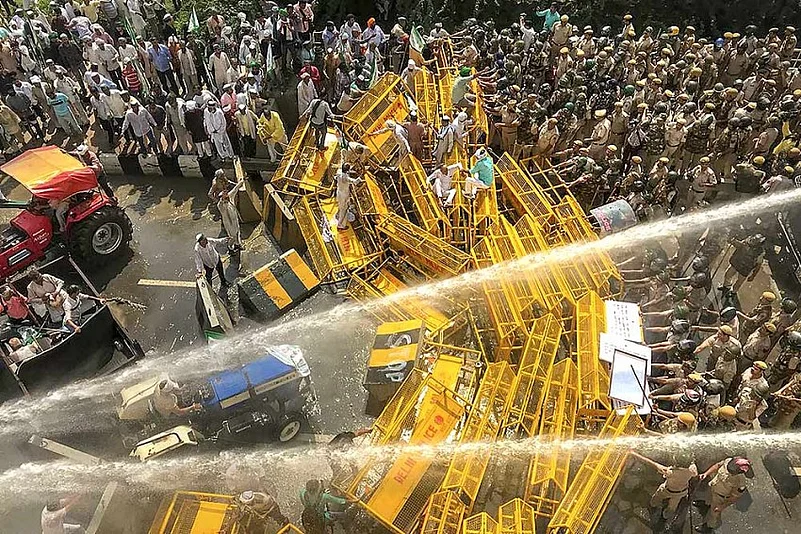Farmers from Punjab faced water cannons and broke police barriers at the state’s border with Haryana as they pushed towards the national capital Thursday on their “Delhi Chalo” march against the Centre’s farm laws.
By late evening, a large group of them had reached the road toll plaza at Panipat, about 100km from Delhi. Bhartiya Kisan Union (Haryana) leader Gurnam Singh said the protesters planned to spend the night there and will resume the march the next morning.
There were traffic snarls during the day at Delhi’s border with police checking vehicles coming in from Haryana and Uttar Pradesh. Metro services between Delhi and NCR areas were restricted.
At the Punjab-Haryana Shambhu border, police and Punjab farmers in their tractor-trolleys were locked in a confrontation for a couple of hours in the morning.
Police made announcements on loudspeakers asking the farmers assembled on the Punjab side to disperse.
But as protesters tried to push through barricades, Haryana Police used a water cannon and lobbed teargas shells. Farmers chucked some steel barricades into the Ghaggar river from the bridge where they had been stopped.
Apart from this confrontation in Ambala district, there were face-offs between the protesters and police in Haryana’s Sirsa, Kurukshetra, Fatehabad and Jind districts bordering Congress-run Punjab.
The police had placed cement and steel barricades and parked trucks on the road to stop the farmers’ tractor-trolleys, some of them laden with food for the planned two-day protest, which many felt could extend further.
But a few hours later, at most border-points, the farmers were let through.
At Shambhu, a few protesters initially managed to cross the barricades on foot. Later, the police eased the blockade, allowing the tractors to proceed on the road to Delhi, 20 km away.
But barricades were also set up at other points on this Amritsar-Delhi highway that passes through BJP-run Haryana.
At Karnal, there was another face-off and police again used a water cannon.
By afternoon, several groups of protesters – from Punjab and Haryana – were travelling towards Delhi on tractor-trolleys. Police diverted private vehicles and long lines of trucks were parked on the road.
“It is condemnable that Haryana Police are using such measures to suppress an assembly of peaceful protesters. We are protesting in a peaceful manner, but they want to prevent us from using our democratic right to protest,” a Punjab farmer told reporters earlier at Shambhu.
The police used water cannons also against protesters trying to enter Kaithal district, and at Khanauri border where farmers were protesting under the banner of Bhartiya Kisan Union (Ekta-Ugarhan).
Congress leaders Rahul Gandhi, and Priyanka Gandhi Vadra, CPI(M) general secretary Sitaram Yechury and Delhi Chief Minister Arvind Kejriwal were among the Opposition leaders who slammed the Haryana Police action at Shambhu.
Punjab Chief Minister Amarinder Singh and his Haryana counterpart Manohar Lal Khattar exchanged words over Twitter.
The Congress veteran asked Khattar why his government was stopping farmers, and the BJP leader told him to stop “inciting” them.
Shiromani Akali Dal leader Sukhbir Singh Badal too criticised attempts to thwart the protest. “Today is Punjab's 26/11. We are witnessing the end of the right to democratic protest,” he tweeted.
Haryana Police said they acted with restraint and nobody was seriously hurt during the day. No farmer was arrested, they said.
Ahead of the protest, Haryana had announced sealing its borders with Punjab to prevent farmers from entering the state on their way to Delhi.
Delhi Police had also made clear that they had denied permission to the farmer organisations planning to protest in the capital on November 26 and 27.
In Gurgaon, Swaraj India president Yogendra Yadav and a group of protesters were detained by police while they were on their way to Delhi. In Delhi, commuters from Haryana and Uttar Pradesh complained of traffic jams due to police checks.
"I had to go to Noida regarding a case in the morning. While I was returning from there in the evening, there was heavy traffic at Delhi-Noida border," advocate Rohit Tomar said,
"Police personnel were checking vehicles. I was stuck there for almost half an hour," he said.
At Singhu, on Haryana’s border with the capital, the Delhi police had stationed five sand-laden trucks to stop tractor-trolleys. Drones too were deployed.
While clarifying that Delhi’s borders had not been sealed, officials said all pickets were active and vehicles entering the city were being checked.
Police were also deployed on Delhi’s border with Faridabad and Gurgaon.
Punjab farmers, representing over 30 farm bodies, had announced they will go to Delhi through several routes -- Lalru, Shambhu, Patiala-Pehowa, Patran-Khanauri, Moonak-Tohana, Ratia-Fatehabad and Talwandi-Sirsa.
Farmer bodies said they will hold a dharna wherever they are stopped from moving towards the national capital.
BKU (Ekta-Ugarhan) general secretary Sukhdev Singh Kokrikalan had claimed 25,000 women will participate and over 4,000 tractor-trailers were arranged for the protest.
The farmers are demanding the repeal of the new laws which deregulate the sale of agriculture produce.
They say the laws will lead to the dismantling of the minimum support price (MSP) system.


























